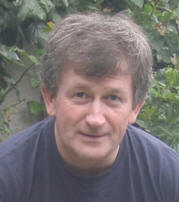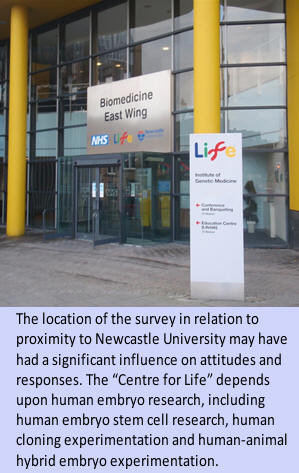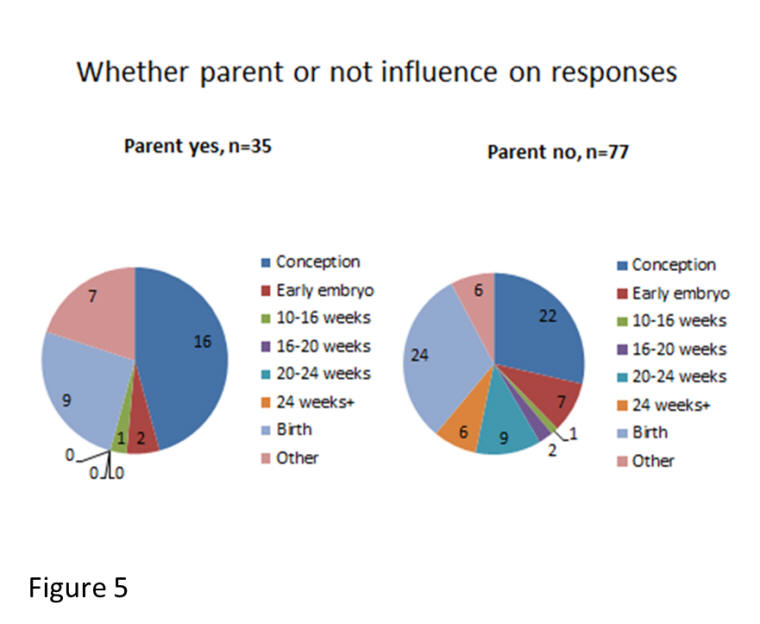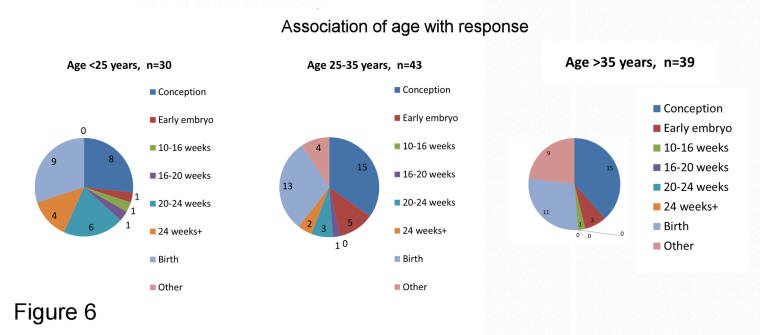Catholic Medical Quarterly Volume 67(1) February 2017
News
The Beginning of Life: UK report -
A survey among doctors &
medical students
Dr Dermot Kearney, MRCPI.
Introduction
 It is a
well-established scientific fact that human life begins at conception.
[1-7] Each new human embryo, from its first moment of existence, has its
own unique DNA and its own personal identity. It is truly a new, unique,
living human individual. The Catholic Church has consistently taught that
each and every human life is sacred and must be respected as such and
protected from conception until natural end. [8]
It is a
well-established scientific fact that human life begins at conception.
[1-7] Each new human embryo, from its first moment of existence, has its
own unique DNA and its own personal identity. It is truly a new, unique,
living human individual. The Catholic Church has consistently taught that
each and every human life is sacred and must be respected as such and
protected from conception until natural end. [8]
Despite the strength of the evidence there are many who do not believe, or at least refuse to accept, that life does actually begin at conception. Strange as it may sound, the numbers of such non-believers include some doctors and “scientists.” There may be several possible reasons why some people do not believe that life begins at conception. For the general public, in some cases, it might be explained simply by a lack of knowledge of the basic facts. This is unlikely, however, to be the case for doctors and scientists. They surely cannot claim ignorance of the scientific facts. There may be a degree of arrogant denial of reality in some cases. For some, to admit that human life begins at conception could have major life-changing implications. For some, it could mean an abandonment of previously-held beliefs and possibly a loss of career and livelihood. For some, especially those involved in the abortion, contraceptive and human embryo-research industries, accepting that human life begins at conception means acknowledging that they have been involved in the destruction of innocent human life at its earliest and most vulnerable stages. Such an acknowledgement could have major consequences for some individuals. Major life-changing decisions might have to be faced. Tremendous feelings of guilt and shame might have to be endured.
It has not been previously ascertained what percentage of medical doctors working in the United Kingdom (UK) actually believe and accept that life begins at conception and how many believe that life begins at some other, arbitrarily chosen, stage of human development. The current study attempts to address this question. A simple questionnaire was designed to facilitate the study.
Aims of study
The study had two main aims:
- To ascertain what percentage of doctors and medical students believe that human life begins at conception and to identify how many believe that life begins at other stages of human development.
- To raise awareness of this issue among doctors and medical students as it is likely that many never even consider the question as to when human life actually begins.
The idea for the study was also partially inspired by the then forthcoming Federation of European Catholic Medical Associations (FEAMC) XIIIth Congress scheduled to be held in Porto, Portugal from September 29th to October 2nd 2016. One of the sessions would address questions specifically relating to “The Beginning of Life” and it was considered that a new study exploring a unique UK perspective on this issue might raise considerable interest among participating delegates at the Congress.
Method
 The
study was carried out in a single, large, NHS teaching hospital affiliated
to the University of Newcastle in the North-East of England. This may be
an important factor in relation to the specific question addressed in this
study and this issue will be considered in detail in the discussion to
follow. Over a four week period in May and June 2016 a total of 112
questionnaires were completed by randomly-selected doctors and medical
students (mostly in the third year of their studies) working and studying
at this single site hospital.
The
study was carried out in a single, large, NHS teaching hospital affiliated
to the University of Newcastle in the North-East of England. This may be
an important factor in relation to the specific question addressed in this
study and this issue will be considered in detail in the discussion to
follow. Over a four week period in May and June 2016 a total of 112
questionnaires were completed by randomly-selected doctors and medical
students (mostly in the third year of their studies) working and studying
at this single site hospital.
The questionnaire was a single A4 sheet as illustrated in Figure 1. below. Statistical analysis was done using Pearson’s chi-squared test.

Two simple questions were asked:
- What 1-2 words (if any) come to mind when you consider the phrase “beginning of life?”
- In your opinion, when does human life begin?
The first question was designed to simply initiate and orientate a thinking process. The key question was the second one.
A number of demographic factors were requested from each respondent. These were chosen as likely factors that might influence opinions in relation to the key question. They were also carefully chosen to ensure that anonymity would be preserved. They were intentionally not overly investigative or intrusive. Respondents were free to answer as few or as many questions as they wished and were also free to refuse participating entirely. Only two questionnaires distributed were not returned (2/114). The response number of 112 represented approximately 35% of the total medical workforce at this institution and a similar percentage of the medical students available for participation in the study at that time.
Method
The complete data is outlined in Table 1
with the
complete samples response to the key question in Figure 2.
Table 1 In your opinion, when does life begin?
| Total | Con-ception | Early Embryo Stage | 10-16 weeks | 16-20 weeks | 20-24 weeks | 24+ weeks | Birth | Other | |
| All Respondents | 112 | 38 | 9 | 2 | 2 | 9 | 6 | 33 | 13 |
| Gender | |||||||||
| Male | 57 | 18 | 1 | 2 | 1 | 4 | 0 | 21 | 10 |
| Female | 55 | 20 | 8 | 0 | 1 | 5 | 6 | 12 | 3 |
| Age Groups | |||||||||
| <25 yrs | 30 | 8 | 1 | 1 | 1 | 6 | 4 | 9 | 0 |
| 25-35 yrs | 43 | 15 | 5 | 0 | 1 | 3 | 2 | 13 | 4 |
| >35 yrs | 39 | 15 | 3 | 1 | 0 | 0 | 0 | 11 | 9 |
| Parent | |||||||||
| Yes | 35 | 16 | 2 | 1 | 0 | 0 | 0 | 9 | 7 |
| No | 77 | 22 | 7 | 1 | 2 | 9 | 6 | 24 | 6 |
| Faith | |||||||||
| Yes | 48 | 24 | 5 | 2 | 0 | 1 | 1 | 9 | 6 |
| No | 64 | 14 | 4 | 0 | 2 | 8 | 5 | 24 | 7 |
Figure 2

Discussion
 The
key findings from this survey are that 34% (38/112) of qualified doctors
and medical students questioned believe that life begins at conception and
that a remarkable 30% (33/112) expressed the belief that life begins at
birth! These two groups, with the two largest representations in this
survey, represent the most extreme responses that were obtained. They
cannot both be correct. It is not possible, at this stage, to know if the
views expressed are representative of the medical profession as a whole.
This question, however, is worthy of further exploration. As mentioned
above, the location of the survey in relation to proximity to Newcastle
University may have had a significant influence on attitudes and
responses. The hospital in which this study was carried out is affiliated
to the University of Newcastle, playing an important role in the training
of medical students from Newcastle University.
The
key findings from this survey are that 34% (38/112) of qualified doctors
and medical students questioned believe that life begins at conception and
that a remarkable 30% (33/112) expressed the belief that life begins at
birth! These two groups, with the two largest representations in this
survey, represent the most extreme responses that were obtained. They
cannot both be correct. It is not possible, at this stage, to know if the
views expressed are representative of the medical profession as a whole.
This question, however, is worthy of further exploration. As mentioned
above, the location of the survey in relation to proximity to Newcastle
University may have had a significant influence on attitudes and
responses. The hospital in which this study was carried out is affiliated
to the University of Newcastle, playing an important role in the training
of medical students from Newcastle University.
It also provides training at foundation level for newly-qualified doctors from the same university. Many of the more senior doctors at core medical, core surgical and specialist training levels of their careers will also have received undergraduate training at Newcastle. Some may have participated in additional research or doctorate programmes at the University of Newcastle. This university has been a pioneer and a leader in the area of human embryo research in the UK. Much of the human embryo research, including human embryo stem cell research, human cloning experimentation and human-animal hybrid embryo experimentation is carried out at the “Centre for Life” in central Newcastle. This building complex houses scientists working for Newcastle University, North-East England Stem Cell Institute, NHS Newcastle Fertility Centre and NHS Northern Genetics Centre. It should be considered a possibility that the presence of this type of research and its support through the University of Newcastle may have a major influence on medical students and doctors who train in the North-East of England, particularly in relation to their attitudes on “beginning of life” issues. On the other hand, if the responses are truly representative of medical profession opinion then there is cause for concern. How can 30% of educated physicians, despite the evidence to the contrary, believe that life begins at birth? What must they consider is happening to the developing living being in the womb during the previous 40 weeks?
If these results are truly representative of beliefs within the medical profession and among medical students one can only wonder at what the responses might be among the general population if asked the same question as to when human life begins. Once again, this question is worth addressing.
Regarding the demographic factors that were considered likely to possibly influence opinions, the only one that actually proved significantly influential was that related to whether or not respondents expressed having a faith. Those who professed to having a faith were far more likely to state that life begins at conception than at any other stage of development (24 of 48 (50%), compared to 38 of 112 (34%); p=0.046). Figure 3 shows that those who professed to have no faith were more likely, but not to a statistically significant degree, to state that life begins at birth than at any other stage (24 of 64 (38%) vs 33 of 112 (30%); P=0.25).

Purely by accident, respondents in the survey were almost equally divided by gender (male 57, female 55). Gender alone, however, was not a strong influential factor in relation to the key question. Among males, 18 of 57 (32%) believed that life begins at conception while 20 of 55 (36%) females held the same belief. Of note, however, females were much less likely than their male counterparts to believe that life begins at birth (12 of 55 (22%) vs 21 of 57 (37%) respectively; P=0.048). (see figure 4)

Similarly there was a trend towards belief that life begins at conception rather than at birth or other stages of development for those who were already parents but this was not a strong influential factor, possibly because the number of respondents who were parents was relatively low (35 parents vs 77 non-parents). Those who were not parents were almost as likely to believe that life begins at conception compared to other non-parents who believed that life begins at birth (22 vs 24) (Figure 5)

Responses among the different age groups were remarkably very similar as to belief whether life begins at conception or at birth or other stages of development. Among those under 25 years of age, 8 of 30 (27%) expressed the belief that life begins at conception. The remaining 22 (73%) stated that life begins at some other stage of development or did not know. This majority included 9 of 30 (30%) who expressed the belief that life begins at birth. In the 25-35 year age group 15 of 43 (35%) believed life begins at conception and 13 of 43 (30%) believed it begins at birth. Among the older age group, over 35 years of age, 15 of 39 (38%) believed life begins at conception and 11 of 39 (28%) believed that birth denotes the beginning of human life (Figure 6).

It will be noticed that 13 of the responses are classified as “other”. This group presented responses that didn’t qualify for any of the other groups. In some cases they represented influence from Hinduism or Eastern religion beliefs with three of the responses being “life begins when another life ends”, “seven reincarnations of Vishnu” and “only transforms from one form to another”. Two of the respondents seem to have misunderstood the primary question of “when, in your opinion, does human life begin?” and possibly misread it as “when, in your opinion, did human life begin?” These two responses were “after dinosaurs” and “B.C.” respectively. A small number of respondents, five in total, proclaimed that they didn’t know when life begins or that the beginning was “uncertain”. One respondent may have been attempting to be humorous by stating that human life begins “at the start”. Other responses were a little vague or philosophically indeterminate such as “organogenesis” and “when soul is made”.
On examining the responses that state life begins at times other than conception or birth one can speculate as to what factors might have influenced some of the responses. There were nine responses suggesting that human life begins in the early embryonic and early developmental stages in the first 14-21 days after conception. Even these responses (8% of the total response) are a cause for concern from an ethical viewpoint. If it is believed that human life begins at some stage within 14 days after conception then the use of human embryos for stem cell research could be easily justified. It is likely that respondents who chose this time-frame were influenced by arguments put forward by advocates of human embryo research. Similarly, it must be presumed that those who hold the belief that life doesn’t begin until after implantation in the uterus would be less likely to have ethical concerns over many abortifacient drugs used for “contraceptive” purposes and intra-uterine devices or over in vitro fertilisation procedures, human embryo freezing and embryo disposal.
Those who chose later stages of intra-uterine life as representing “the beginning” were presumably influenced by some established biological factors such as when it is recognised that the foetal heart has started beating or when the brain is seen to be developing. Several responses suggested that life begins when the foetus can be considered viable if born prematurely at around 22-24 weeks gestation. Believing these stages of development to represent the beginning of life would allow those who hold such beliefs to possibly justify abortion for many different reasons up to these points in time. It must be appreciated, of course, that none of these responses represent the truth and that all of these times are arbitrarily chosen without any solid scientific basis. In particular, they all ignore the fact that new life has already begun.
The results of this survey with a minority recognising the truth that human life begins at conception represents a major challenge for those who actually accept the facts. As suggested above, not recognising that human life begins at conception frequently leads to the acceptance of the abuse of the most vulnerable in many ways with the practice of abortion, in vitro fertilisation, human embryo research and destruction and many forms of artificial contraception. In the UK today, facing this challenge is not easy. Meaningful and fair debate about the beginning of life is essentially suppressed and the topic is widely considered a closed book not worthy of discussion. It is not in the interest of many powerful bodies to allow the issue to be discussed and for the public or medical profession to be informed about the truth. These powerful bodies include the British Pregnancy Advisory Service, Marie Stopes International, and the Human Fertilisation and Embryology Authority. Even some of the Royal Colleges have shamefully played their part in promoting a culture of death when they should be protecting life. The Royal College of Midwives, at least through some of their senior leaders, and the Royal College of Obstetricians and Gynaecologists have both recently issued shameful statements affirming their belief in the lack of any intrinsic value of some human lives at the most vulnerable stages of early development. [9-11]
The Catholic Church has consistently stated that all human life is sacred and begins at conception and that all innocent human lives must be cherished and protected from their very beginning until their natural end. The Church, however, is very much a lone voice crying in the wilderness. Is the secular world interested in what the Church has to say? The honest answer is unfortunately “no,” at least not in matters relating to the beginning of life. Abortion, contraception, in vitro fertilisation and human embryo abuse are all very much accepted as being part of modern life in many countries throughout the world and especially in the UK. The views of the Church are often considered irrelevant and outdated. They are not taken seriously and are sometimes ridiculed.
As dissent from mainstream thought and practice is largely suppressed it is vital that groups such as the Catholic Medical Association (UK), the Christian Medical Fellowship, the Alliance of Pro-life Students and other pro-life organisations come together and speak with one voice so that the truth can be revealed. The public need to know when life begins. Shockingly, doctors and medical students also need to be educated (or perhaps re-educated) as to when human life begins. Education is the key but to promote education, debate and discussion must take place. Surveys such as this one may help to open debate. I hope that similar studies will be replicated in other regions of the UK and bring attention to this issue.
One final point worth noting from this study is that 64% of doctors stated that they do not have any religious belief. While this may not be a surprise and may be representative of the lack of religious belief among the general population it is another cause for serious concern. In the opening chapter of his classic Society and Sanity, the great Catholic writer and philosopher, Frank Sheed, makes the point that “Sanity means seeing what is, living in the reality of things. If a person sees what is not…he is not sane.” [12] If there is a God (and the circumstantial evidence is overwhelming that there is) then those who do not believe in His existence are not seeing things as they are. They are, in effect, divorced from reality. They are not sane, in this sense of the word. Who wants to be attended by a physician who is out of touch with reality? Who wants to be attended by a doctor who is not sane? This may be a question for another day and another study.
References:
- “The American College of Pediatricians concurs with the body of scientific evidence that human life begins at conception—fertilization… At the completion of the process of fertilization, the human creature emerges as a whole, genetically distinct, individuated zygotic living human organism, a member of the species homo sapiens, needing only the proper environment in order to grow and develop. The difference between the individual in its adult stage and in its zygotic stage is not one of personhood but of development.” When Human Life Begins. American College of Pediatricians – March 2004
- “Scientists Attest To Life Beginning At Conception” Report, Subcommittee on Separation of Powers to Senate Judiciary Committee S-158, 97th Congress, 1st Session 1981.
- Dox, Ida G. et al. The Harper Collins Illustrated Medical Dictionary. New York: Harper Perennial, 1993, p. 146 "Embryo: An organism in the earliest stage of development; in a man, from the time of conception to the end of the second month in the uterus."
- J.P. Greenhill and E.A. Freidman. Biological Principles and Modern Practice of Obstetrics. Philadelphia: W.B. Saunders Publishers, 1974, Pages 17 and 23. “The term conception refers to the union of the male and female pronuclear elements of procreation from which a new living being develops. It is synonymous with the terms fecundation, impregnation, and fertilization … The zygote thus formed represents the beginning of a new life.”
- Rand McNally. Atlas of the Body (New York: Rand McNally, 1980) 139, 144 “In fusing together, the male and female gametes produce a fertilized single cell, the zygote, which is the start of a new individual.”
- Clark, J. ed., The Nervous System: Circuits of Communication in the Human Body. Torstar Books Inc., Toronto, 1985, page 99 “Each human begins life as a combination of two cells, a female ovum and a much smaller male sperm. This tiny unit, no bigger than a period on this page, contains all the information needed to enable it to grow into the complex… structure of the human body. The mother has only to provide nutrition and protection.”
- The Developing Human: Clinically Oriented Embryology, 6th ed. Keith L. Moore, Ph.D. & T.V.N. Persaud, Md., (Philadelphia: W.B. Saunders Company, 1998), 2-18: “A zygote is the beginning of a new human being. Human development begins at fertilization, the process during which a male gamete or sperm… unites with a female gamete or oocyte… to form a single cell called a zygote. This highly specialized, totipotent cell marks the beginning of each of us as a unique individual.”
- Catechism of the Catholic Church #2270 “Human life must be respected and protected absolutely from the moment of conception.”
- “Royal College of Midwives backs abolition of abortion law that could see women terminate unborn child at any point.” The Telegraph, 15 May 2016.
- Symons, Xavier. “New Down’s Syndrome test could save money, say British Obstetricians”. Bioedge, 24 September 2016.
- “If the decision has been made primarily on cost grounds, then a more rigorous economic analysis has to be made that includes the lifetime costs of caring for children and adults with Down’s syndrome (bearing in mind that cfDNA testing as a primary screen test will identify approximately 289 more babies with trisomies). Such an economic analysis may (or may not) suggest that cfDNA testing for all is cost-effective.” Submission by Dr Sadaf Ghaem-Maghami, chair of Scientific Advisory Committee of the Royal College of Obstetricians and Gynaecologists to the UK National Screening Committee: Screening for cfDNA screening in pregnancy – an evidence review (2016).
- Sheed, Frank. Society and Sanity. Chapter 1 “Sanity is the point” page 2. Ignatius Press 2013. First published 1953 by Sheed & Ward, New York.
